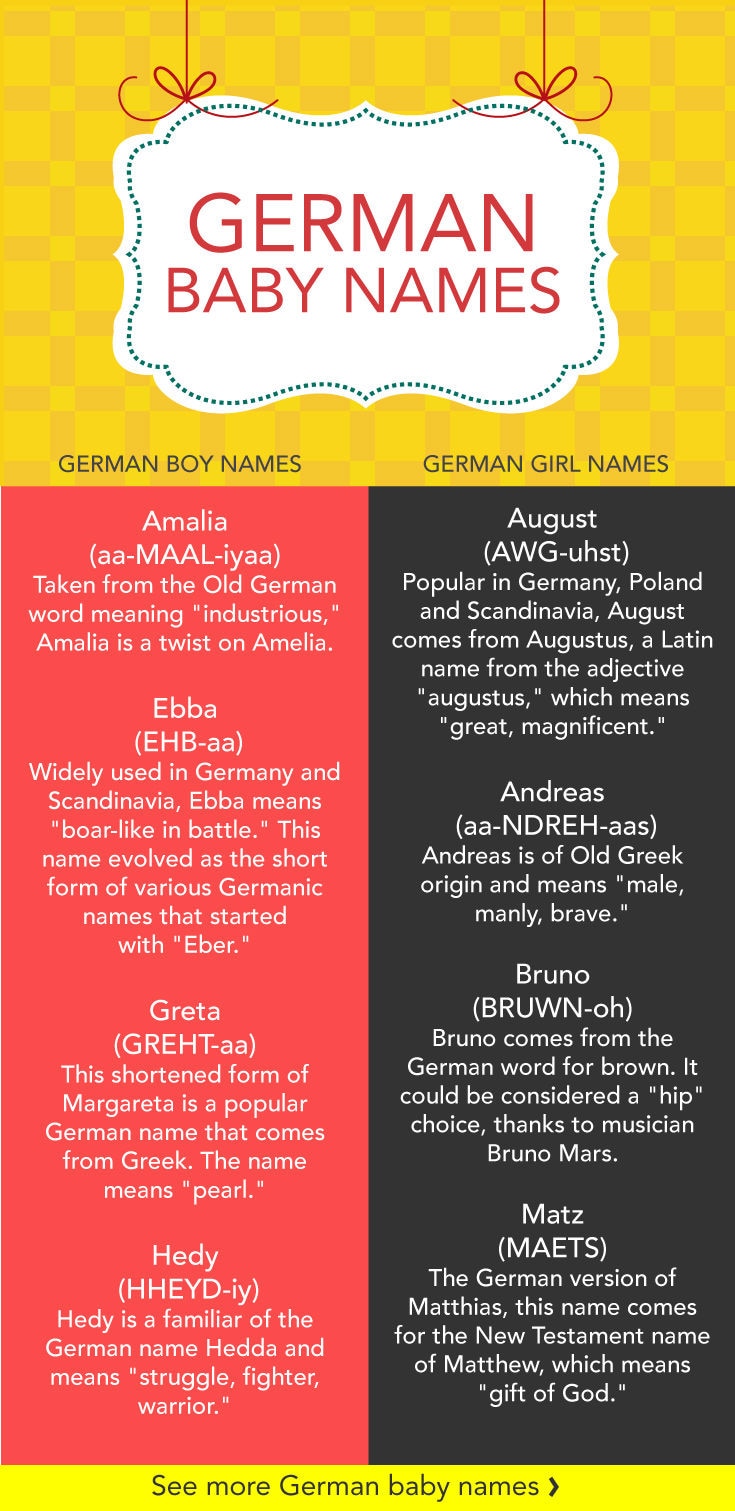Are you considering German baby names as you thumb through those baby name books? Are you enamored with beer, sausages, castles and Oktoberfest? Giving your child a German name will pay homage to the land you love.
Naming your baby will be one of the first big decisions you make for your child, which can feel a bit daunting. Step one is to go with what you love. “Pick a name that might be from somewhere special, or that might just be a name you love” says Kerry Sparks, coauthor of “Hello My Name is Pabst,” a hipster baby name book. “Naming is completely subjective — what’s normal to you will make others cringe — so don’t worry about haters,” she adds.
There aren’t any solid “rules” about naming your baby, although naming experts have some suggestions. “Keep the spelling fairly simple and easy to pronounce,” suggests Eleanor Turner of Lemonade Babies, a birth doula and author of “Baby Names 2015.” “I tell everyone that they should just be able to fall in love with the names they choose — after all, they’re going to stick around forever.
One tip I do suggest, though, is to keep your choices private until after your baby is born. People always seem to have an opinion on names before babies arrive, but afterwards, everyone is so excited to see they if they have their dad’s eyes and their grandma’s chin, that they love and accept their name anyway. Keeping it private and special keeps it meaningful and, frankly, untainted.”If German baby names are what you love.
Here’s a list of 18 ideas to get you started in your naming quest:

German Names for Girls
- Amalia (aa-MAAL-iyaa)
Taken from the Old German word meaning “industrious,” Amalia is a twist on Amelia.
- Ebba (EHB-aa)
Widely used in Germany and Scandinavia, Ebba means “boar-like in battle.” This name evolved as the short form of various Germanic names that started with “Eber.”
- Greta (GREHT-aa)
This shortened form of Margareta is a popular German name that comes from Greek. The name means “pearl.”
- Hedy (HHEYD-iy)
Hedy is a familiar of the German name Hedda and means “struggle, fighter, warrior.”
- Johannah (yo-HAH-nah)
Meaning “God is gracious,” this name comes from Joanna, the female version of John.
- Leni (LEY-niy)
A popular German nickname for Helena, this name means “bright and shining light.”
- Mitzi (MIHTZ-iy)
Mitzi comes from Hebrew and means “sea of bitterness, rebelliousness.” It’s the German pet form of Maria.
- Pia (PIY-ah)
Used throughout Germany and Scandinavia, this name comes from the Latin name meaning “pious, dutiful.”
- Rosamund (ROW-zaa-mahnd)
The name Rosamund means “horse protector, rose of the world, pure rose.” It’s derived from the Germanic elements “hros” or “hruod” combined with “munt” (meaning “protection, protector”).Later, in the Medieval period, it was associated with the Latin “rosa” combined with the second element “mundi” or “munda,” giving rise to the meaning “rose of the world” or “pure rose.”
German Names for Boys
- August (AWG-uhst)
Popular in Germany, Poland and Scandinavia, August comes from Augustus, a Latin name from the adjective “augustus,” which means “great, magnificent.”
- Andreas (aa-NDREH-aas)
Andreas is of Old Greek origin and means “male, manly, brave.”
- Bruno (BRUWN-oh)
Bruno comes from the German word for brown. It could be considered a “hip” choice, thanks to musician Bruno Mars.
- Matz (MAETS)
The German version of Matthias, this name comes for the New Testament name of Matthew, which means “gift of God.”
- Gunther (GUWNT-er)
This boy name comes from the words “gund” and “heri” with the meaning “fight” and “army, warrior” respectively.
- Hugo (HHUYK-ow)
This name is of Germanic origin and developed as a Latinized alternate form of Hugh in the mid-19th century. It means “heart, mind, spirit.” Lots of famous, creative and strong men bear the name Hugo, including menswear designer Hugo Boss and novelist Victor Hugo.
- Otto (AAT-oh)
This classically German name means “wealthy.” It developed as a short version of Germanic names with the first element “uod” (meaning wealth, fortune). Odo is an earlier form of Otto.
- Theodoric (THEE-ah-DOR-ik)
Meaning “ruler of the people,” this two-element name comes from “thiuda” (meaning “people, race”) and “reiks” (meaning “rich, powerful, ruler”). Theodoric of Freiberg is a famous German theologian and scientist who bears this name.
- Helmut (HEHLM-uwt)
Helmut is a two-element name derived from the elements “helm” (meaning “helmet, protection”) and “muot” (meaning “spirit, courage”). The name was first invented in the late Middle Ages but is still a popular German name today.
Kimberly DeMucha Kalilis a freelance journalist and software consultant living in Southern Arizona with her husband and two children. Find her on Twitter.






